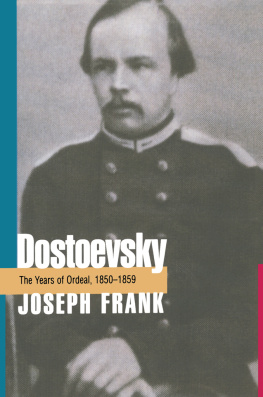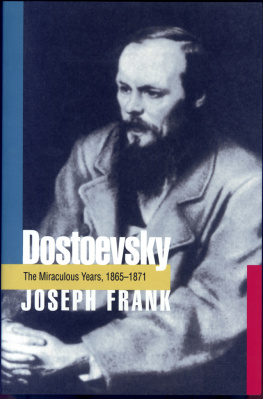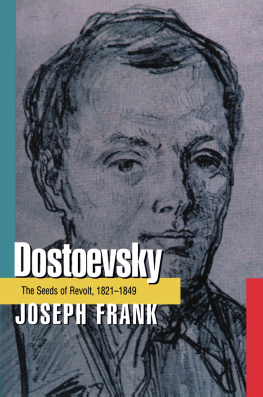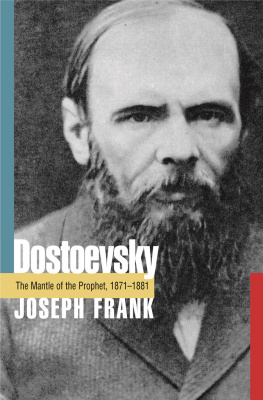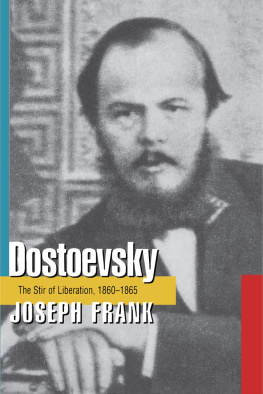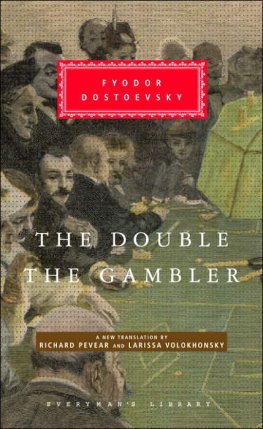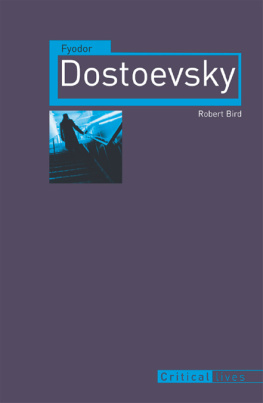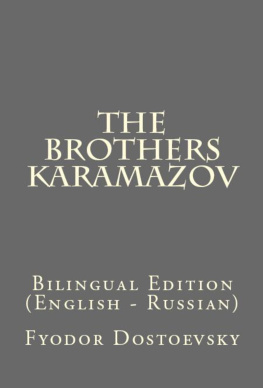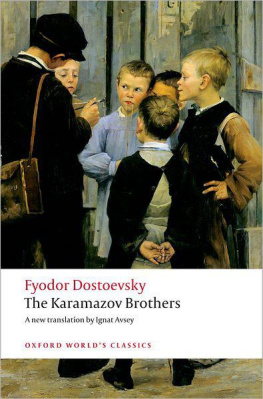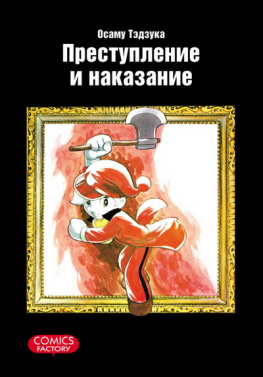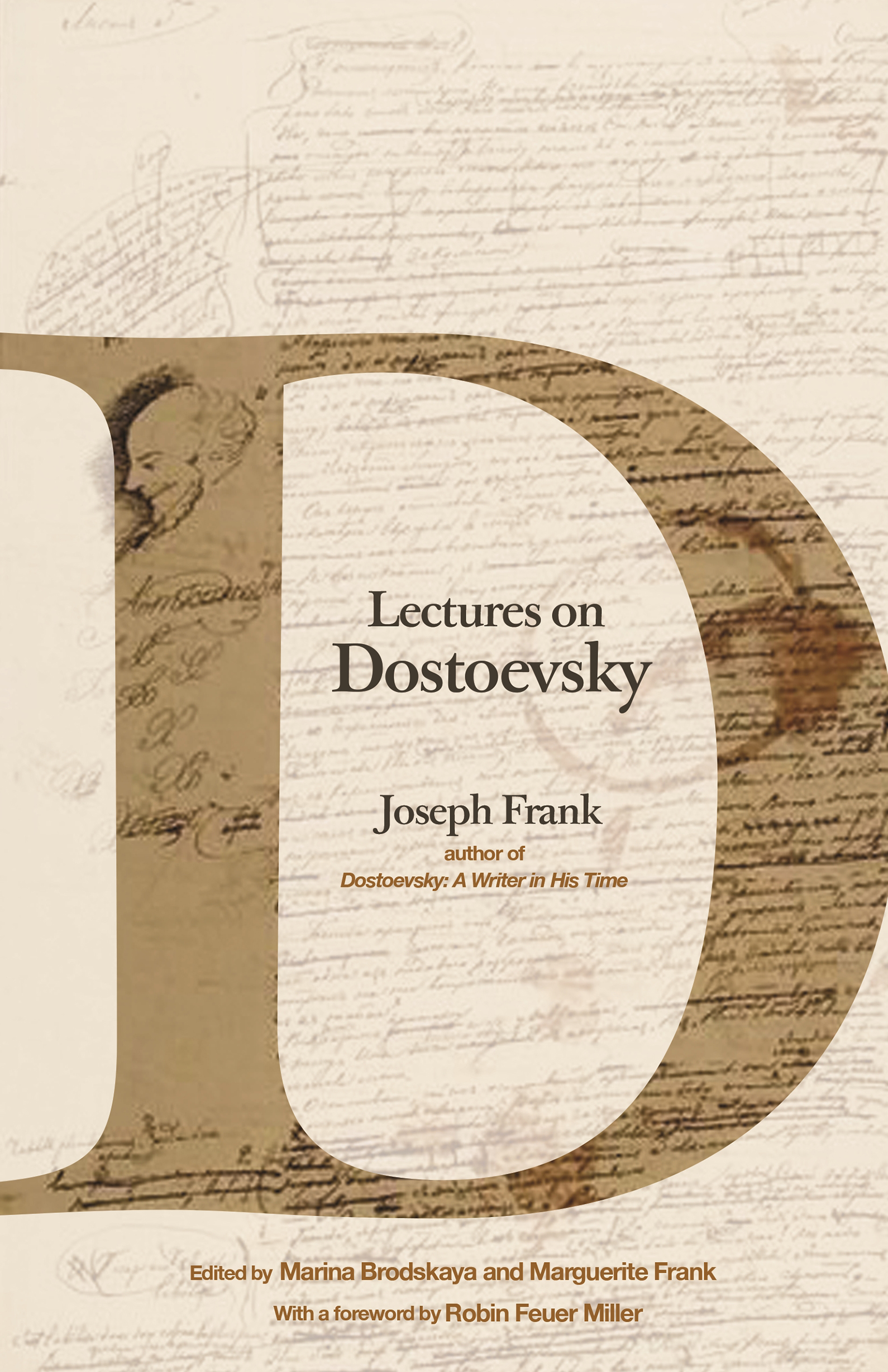LECTURES ON DOSTOEVSKY
Lectures on
Dostoevsky

Joseph Frank
Edited by Marina Brodskaya and Marguerite Frank
PRINCETON UNIVERSITY PRESS
PRINCETON & OXFORD
Copyright 2020 by Princeton University Press
Published by Princeton University Press
41 William Street, Princeton, New Jersey 08540
6 Oxford Street, Woodstock, Oxfordshire OX20 1TR
press.princeton.edu
All Rights Reserved
Library of Congress Cataloging-in-Publication Data
Names: Brodskaya, Marina, 1957- author. | Frank, Marguerite, editor. | Frank, Joseph, 1918-2013, author.
Title: Lectures on Dostoevsky / Marina Brodskaya, Marguerite Frank, Joseph Frank.
Description: Princeton : Princeton University Press, 2019.
Identifiers: LCCN 2019020469 | ISBN 9780691178967 (hardcover)
Subjects: LCSH: Dostoyevsky, Fyodor, 1821-1881--Criticism and interpretation.
Classification: LCC PG3328.Z6 B685 2019 | DDC 891.73/3--dc23
LC record available at https://lccn.loc.gov/2019020469
ISBN (e-book): 9780691189567
Version 1.0
British Library Cataloging-in-Publication Data is available
Editorial: Anne Savarese and Jenny Tan
Production Editorial: Ellen Foos
Text and Jacket Design: Leslie Flis
Production: Erin Suydam
Publicity: Jodi Price and Katie Lewis
Copyeditor: Aimee Anderson
Jacket art: Manuscript page from Dostoevskys Demons (18711872)
Grateful acknowledgment is made for permission to reprint Joseph Franks Dostoevsky from Consider the Lobster and Other Essays by David Foster Wallace. Copyright 2005 by David Foster Wallace. Used by permission of Little, Brown and Company.
courtesy of the family of Joseph Frank.
FOREWORD
In 2002, when Joseph Frank completed his five-volume literary biography of Dostoevsky, he joined the ranks of such biographers as Leon Edel (Henry James: A Life), Richard Ellmann (James Joyce), Walter Jackson Bate, (John Keats), Janet Browne (Charles Darwin: A Biography), not to mention James Boswell and his Life of Johnson. In any project spanning decades, ones view of ones subject changes, as does the cultural and critical climate surrounding the biographer himself. Franks opus reflects both his evolving take on Dostoevskythe writer, the thinker, the manand his own development as a major critic of our time, one whose early preoccupations with theory gave way to his subsequent interest in creating, by the time he reached volume 5 (Dostoevsky: The Mantle of the Prophet, 18711881), an almost day-by-day account of the last decade of Dostoevskys life. Readers can even indulge in drawing parallels between the number of pages of Franks biography and those of Dostoevskys novels or between the span of decades of each as well: there is a similarity of scale, a similarity of preoccupation with certain big themes and ideas, as well as movement forward in surprising new directions. Monumental biographies, such as Franks Dostoevsky volumes, shape the way we understand not only a writer and his work but the worldboth the subjects world and our own. Frank later worked to condense his hefty opus into a single-volume version that appeared in 2009: Dostoevsky: A Writer in His Time represents a fascinating distillation of literary analysis and cultural history.
But now, posthumously, a completely new distillation, in yet another genrethe lecturehas appeared. Lectures on Dostoevsky by Joseph Frank, edited by Marina Brodskaya and Marguerite Frank, renders an exquisite yet provocative series of Franks lectures to his students at Stanford, where, astonishingly, only after his retirement from Princeton did he, arguably the worlds most renowned Dostoevsky scholar, begin regularly to teach a course on Dostoevsky from within a Slavic department. (Years earlier, when visiting Harvard, he had offered a course on Dostoevsky.) The Lectures are a gift to general readers as well as to scholars of Dostoevsky, who will surely find themselves pondering the contrast between Franks emphases in his critical writings and those in evidence in his lectures to students and a more broadly based reading public.
Joseph Frank was born in 1918 on the Lower East Side of Manhattan, an immigrant neighborhood where many of Americas future intellectuals spent their childhoods. His father died when he was a young child, and he was adopted by his mothers second husband, William Frank. Those who knew Frank will remember that he suffered from an occasional stammer, which remarkably did not hamper his brilliance as a lecturer. Turning inward as a child, he became a voracious reader and, while still in high school, attended lectures at the New School for Social Research. His parents died when he was still a young man, and nearly penniless, he traveled to the University of Wisconsin where he had heard that the dean was sympathetic to Jewish students seeking an education. Amazingly, although he had never received a BA, he was accepted and earned a PhD at the University of Chicago from the famous Committee on Social Thought.
During the 1940s and beyond Frank began to publish a series of ground-breaking essays and quickly became recognized as one of the countrys most promising literary critics and theorists. His essay Spatial Form in Modern Literature, first published in 1945, remains a classic and formed the core of his seminal book, The Widening Gyre: Crisis and Mastery in Modern Literature. (This work appeared in a second edition with important additions and commentaries as The Idea of Spatial Form [1991]).
Frank wrote essays for the leading intellectual and literary journals in the United States (such as the Sewanee Review, the Hudson Review, the Partisan Review, and the New Republic) on an impressive range of artists and authorsGide, Flaubert, Malraux, Mann, Goya, Cezanne, Sartre, Proust and, increasingly, Dostoevsky.
Many readers first encountered Franks work on Dostoevsky through his unforgettable essays on Notes from Underground, The Idiot, and The Possessed. Reading these essays could change the way one read not only Dostoevsky but novels in general; both the work and oneself as general reader were simultaneously transformed. It turned out that reading Dostoevsky had already proved transformative for Frank as well: to the surprise and disappointment of some, Frank put aside his role as major theoretician and literary critic to write a literary biography of Dostoevskya biography whose creation spanned the next decades of his life, until 2002. He spent much of his final decade working on the single-volume condensation of the biography and writing essays that appeared in publications such as the New York Review of Books. He published three important collections of his essays, Through the Russian Prism: Essays on Literature and Culture (1989), Between Religion and Rationality: Essays in Russian Literature and Culture (2010), and Responses to Modernity: Essays in the Politics of Culture (2012).
Franks work exhibits a thoughtful integrity, a willingness to follow the evidence wherever it led, even if that meant revising and rethinking a former position. He was a meticulous and creative close reader of texts who brought those readings to bear on the largest, most complex and pressing cultural, political, and social issues of Dostoevskys time and, indirectly, of our own. Although his work on Dostoevsky is routinely hailed as monumental, it should also be hailed as finely observed and closely argued.


